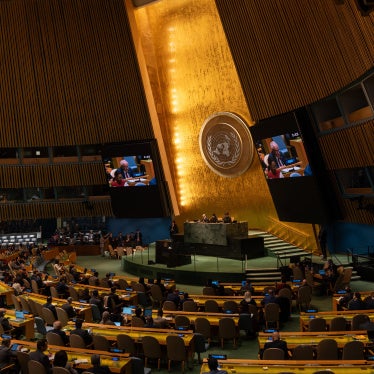The United Nations has taken an important step forward in developing human rights standards for corporations, Human Rights Watch said today.
The U.N. Sub-Commission for the Promotion and Protection of Human Rights today approved the "Draft Norms on the Responsibilities of Transnational Corporations and Other Business Enterprises with Regard to Human Rights." The document sets out the responsibilities of companies for human rights and labor rights, and provides guidelines for companies operating in conflict zones. The Draft Norms also prohibit bribery and activities that harm consumers, including polluting the environment.
"This is now the world's most comprehensive and authoritative standard on corporate responsibility," said Arvind Ganesan, director of the Business and Human Rights Program of Human Rights Watch. "These norms come to fill an important gap in the protection of human rights world-wide."
Historically, voluntary standards and initiatives for companies have been limited to specific industries, such as the Fair Labor Association for the apparel and footwear industry or the Voluntary Principles on Security and Human Rights in the Extractive Industries.
The Norms are not a law or binding set of standards, but can be adopted by governments or companies. Their analysis and commentary could provide the conceptual basis of a binding instrument on corporate responsibility since the Norms are an authoritative interpretation of the responsibilities of corporations under international human rights law.
"Eventually, we'd like to see binding standards for corporations," said Ganesan. "But this is a good first step."
The Norms also begin to close a loophole because they apply to all forms of business and not only transnational corporations. Historically, voluntary standards have been criticized because they only apply to transnational corporations. Companies that adopt voluntary codes of conduct have complained that they suffer a comparative disadvantage when their competitors do not adopt such codes. The Norms, however, apply equally to all businesses.
"The Norms help to level the playing field for companies that want to do the right thing for human rights," said Ganesan. "Now every company's obligations are detailed and no company can say that it doesn't have responsibilities in the area of human rights."







